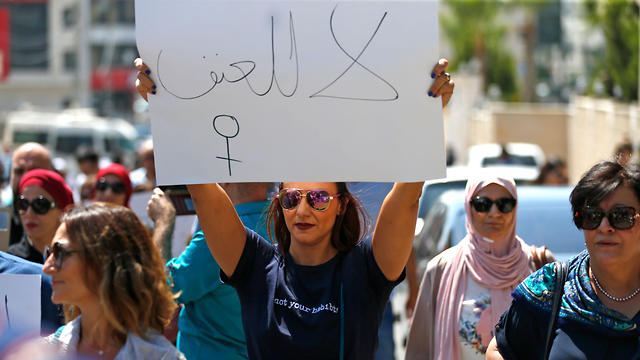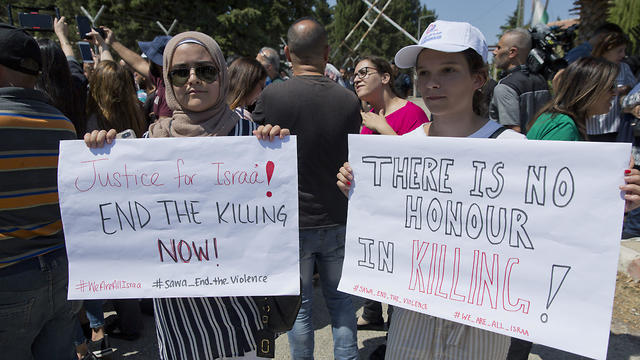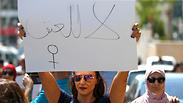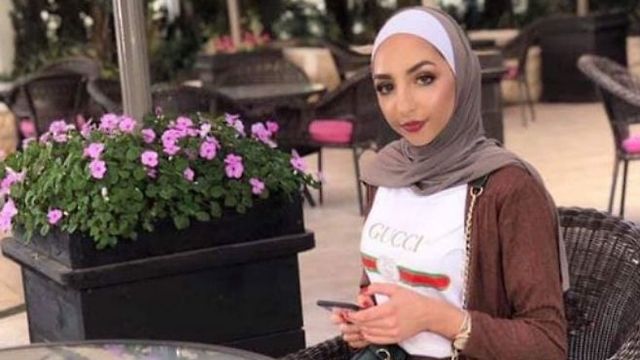
Three family members charged in killing of Palestinian woman
Palestinian AG says 'honor killing' not a factor in death of Israa Ghrayeb, a makeup artist from Bethlehem area, who died last month after being hospitalized with severe wounds; women's rights activists suspect male relatives beat her over video showing with a man who had proposed
Palestinian Attorney General Akram al-Khatib announced Thursday that authorities have charged three relatives of a 21-year-old West Bank woman who died last month in a suspected so-called honor killing.
Israa Ghrayeb, a makeup artist from a village near Bethlehem, died on Agust 22 after being hospitalized with severe injuries. Friends and women's rights activists suspect her male relatives assaulted her over a video she shared online that purportedly showed her out with a man who had proposed to her.
Her friends have circulated what they say is an audio recording of her cousin complaining to her brothers about the video Ghrayeb posted on Instagram.
Ghrayeb died after sustaining serious injuries at home nearly two weeks earlier. Her family released a statement saying she jumped off a second-story balcony, breaking her spine and suffering cuts to her face. It said she had been "possessed by demons" for some time, and was receiving "treatment" from local Muslim clerics.
Al-Khatib said Thursday that three of Ghrayeb's relatives will be charged, but ruled out honor killing as a motive and declined to provide further details.
Protesters demanding justice in the case said they were satisfied with the charges.

Palestinian women's groups say 18 women have been killed so far this year in domestic violence disputes. Many of the cases are suspected honor killings.
Hundreds of Palestinian women held a demonstration in the West Bank earlier this month to demand an investigation into Ghrayeb's death.
In conservative parts of the Middle East, women have been murdered by male relatives over suspicions they violated strict rules on relationships and marriage. Such killings are rare in the Palestinian territories, and the case sparked an outcry online and in Arab media, leading to widespread calls for justice.
Ghrayeb's Instagram page, now closed, had over 12,000 followers, a popular account in her close-knit community. Even though the family says it approved the proposal, the two were not formally engaged. Among very conservative Muslims, their going out together would be seen as inappropriate and potentially bringing shame to the whole family.
The family said in a statement that police took testimony from them and interviewed Ghrayeb in hospital prior to her death.
Hours after the protest, a Palestinian official said that three family members were detained for interrogation.
Women's rights activists say that while the Palestinian Authority has amended decades-old laws that once provided for leniency in honor killings, they still often go unpunished. They say authorities are often hesitant to get involved in what is still seen by many as a private matter.

Palestinian police spokesman Louay Arzeikat said honor killings have declined in recent years.
"Murders occur in every society but there are differences in numbers and circumstances and Palestine is no different from other societies," Arzeikat said.
"Murders defined as so-called 'family honor' killings no longer exists in our society and we do not recognize this term," he added. "In recent years, there has been a decline in killing in general and the murder of women in particular. Our society respects women and helps and supports them and allows them to work and be a partner in life and its struggles."
Arzeikat also said that, "In 2017 there was a further decline and the number of murder victims was 34, of which four were women - two of them in so-called 'family honor' killings.
"In 2018 there was a significant decline and the number of those killed was 24, including three women and only one case of so-called family honor' killings. In 2019, there were 23 murder, including four of women and just one case of so-called 'family honor' murders."
Halima Abu Salb, a women's rights researcher, said Palestinian authorities have ignored calls for a family protection law that would help combat domestic violence and child abuse.
"If the Palestinian Authority wants to apply the international conventions that it has joined, it needs to change the whole set of laws," she said. "Until now these laws are old and full of flaws that can let violent perpetrators get away or get lenient punishments."

















